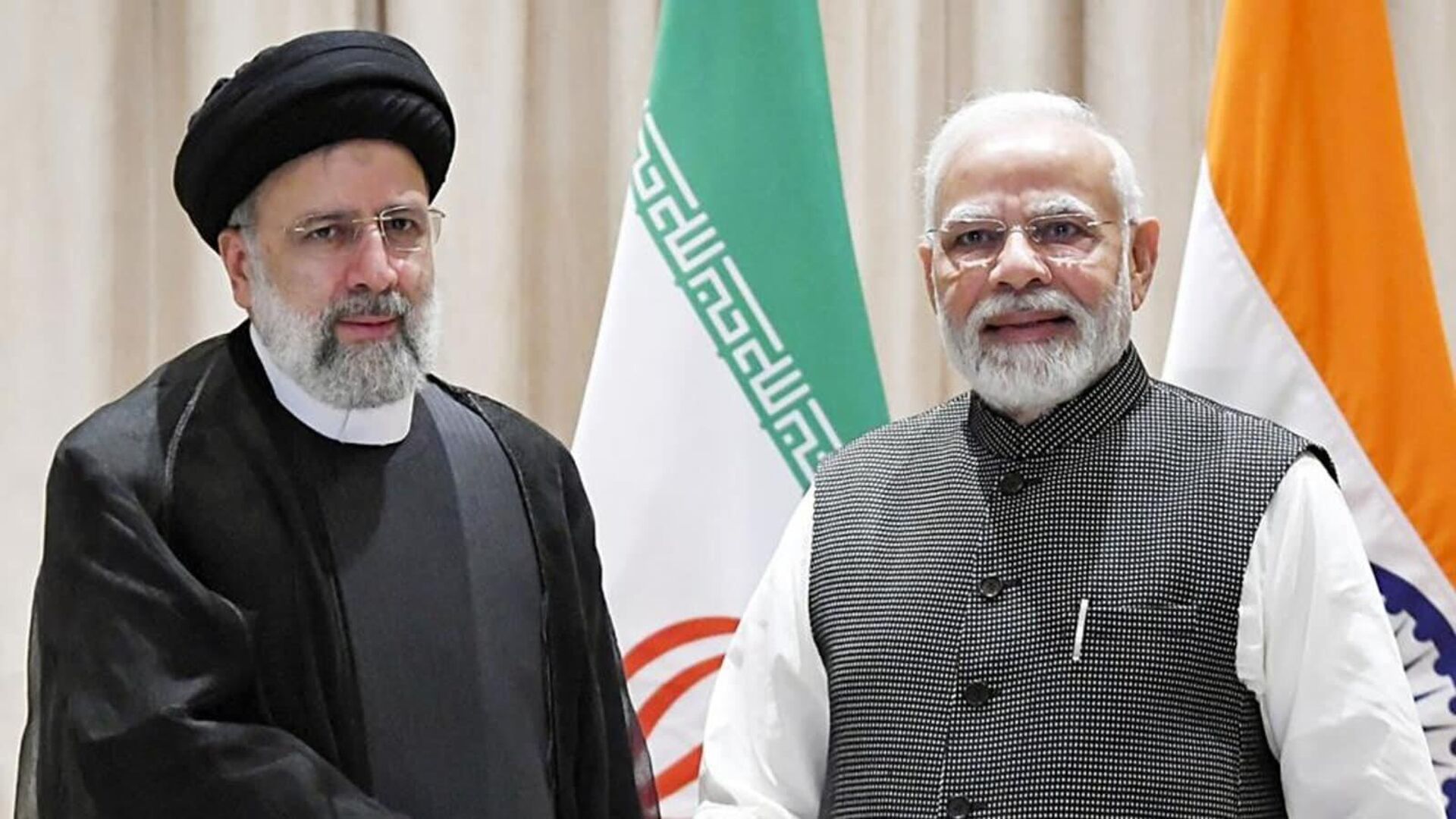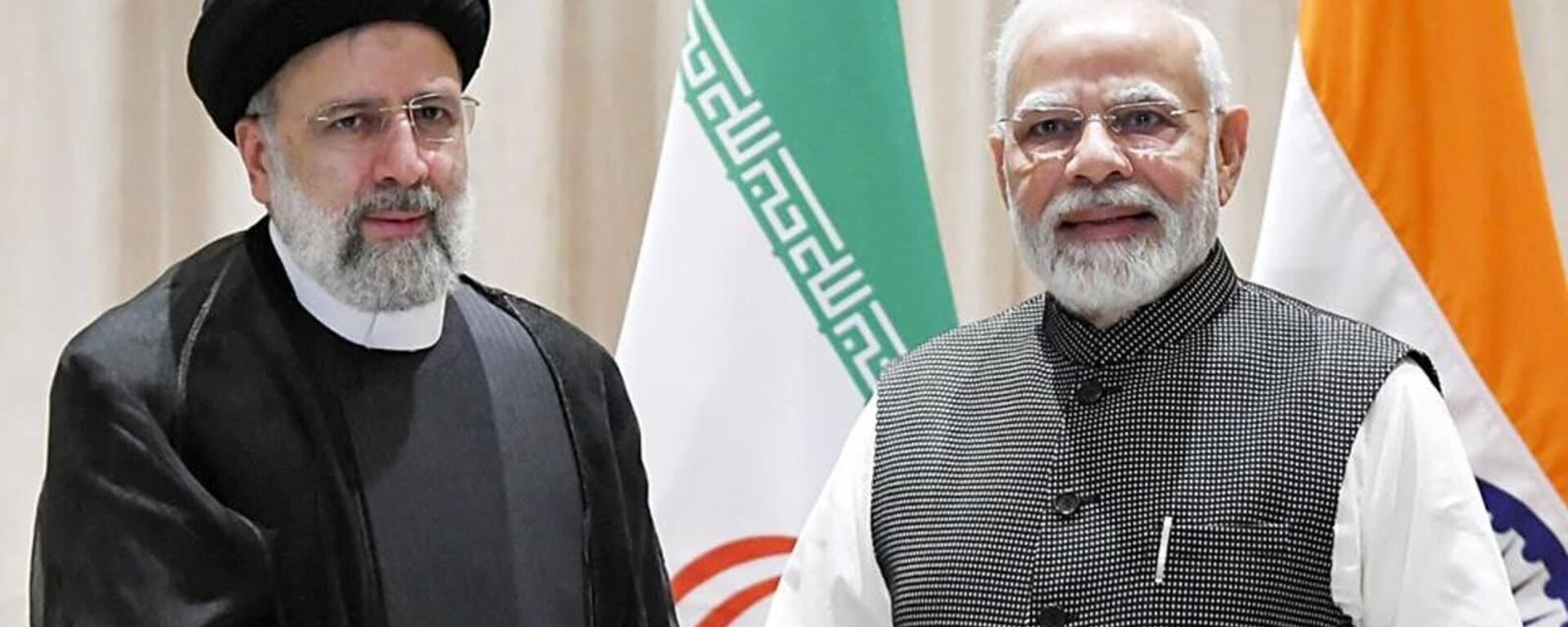https://sputniknews.in/20240522/how-can-india-enhance-its-strategic-relations-with-iran-following-raisis-death-7429389.html
How Can India Enhance its Strategic Relations With Iran Following Raisi's Death?
How Can India Enhance its Strategic Relations With Iran Following Raisi's Death?
Sputnik India
With the US renewing sanctions on the scheme, India faces a significant challenge in securing necessary equipment for the Chabahar port project in Iran... 22.05.2024, Sputnik India
2024-05-22T22:30+0530
2024-05-22T22:30+0530
2024-05-23T10:39+0530
ebrahim raisi
narendra modi
india
iran
china
aukus
indo-pacific
chabahar port
international north-south transport corridor (instc)
central asia
https://cdn1.img.sputniknews.in/img/07e8/05/14/7413433_0:0:1600:900_1920x0_80_0_0_a23e79397654bd123f3f8ecac73a7bf2.jpg
Indian Vice President Jagdeep Dhankhar has arrived in Tehran leading a delegation to pay respects following the death of Iranian President Ebrahim Raisi.Raisi, along with Iranian Foreign Minister Hossein Amir Abdollahian and others, died in a helicopter crash in the country's north-west on Sunday, blamed on bad weather conditions.Mourners in central Tehran holding portraits of Raisi congregated on Wednesday around the University of Tehran, where Supreme Leader Ayatollah Ali Khamenei presided over prayers.Dhankhar paid homage to the departed leaders, conveying his heartfelt wishes for the enduring pride and prosperity of the Iranian nation.His visit also underlines the deepening of diplomatic relations and collaboration between India and Iran.Paying tribute to the Iranian architects of the Chabahar deal signed on May 13, Indian Foreign Minister S Jaishankar emphasized that the long-term agreement for India to oversee the port project would not have materialized without the "interest" and "initiative" of Raisi and Abdollahian.Nurturing India-Iran Relations: A Tale of Resilience and Collaboration"The agreement for this endeavour was forged in 2016 during Prime Minister Modi's diplomatic visit to Iran," he added. "Despite the imposition of sanctions, India has steadfastly continued its operations at the Chabahar port.”Trigunayat pointed out that “India and Iran have collaborated closely," resulting in the landmark 10-year contract for the management of the Chabahar port."This port holds critical importance for India's connectivity to Afghanistan and Central Asia, as well as its involvement in the International North-South Transport Corridor,” he said.The agreement, according to the ambassador, “has garnered unanimous support from all parties involved. Despite the passing of President Raisi, the commitment remains intact, with Indian Ports Global Limited already pledging $250 million towards the venture, indicating a sustained partnership between the two nations”."In 2016, with the signing of the Joint Comprehensive Plan of Action (JCPOA) and the relaxation of sanctions, we revisited the project," he said. "However, within two years, we had to pull out again due to renewed sanctions.”Given the recent reaffirmation from the US regarding sanctions on the project, Ahmad warned that “securing the required equipment poses a significant challenge for India," and it was "crucial for India to learn from past mistakes and not repeat history.""The dilemma of sourcing necessary equipment highlights a pressing issue that needs to be addressed," he stressed. "India must avoid the pattern of withdrawing from the project due to sanctions and instead find innovative solutions to ensure its successful continuation.”Charting India's Strategy in West Asia: Navigating Iran's Crucial Role"Any geopolitical calculations and dynamics involving various countries in the region must duly consider Iran's influence," he added. "Recent events have highlighted this reality.”But Trigunayat argued that “global geopolitics, including sanctions and the ongoing rivalry between Iran and Israel, have added complexities to the situation" in the region. "Despite facing extensive sanctions, Iran, as an ancient civilization, has demonstrated resilience. Nonetheless, its significance remains underscored in the calculations of any country contemplating regional strategies and alliances,” he said."Platforms such as the QUAD (the Quadrilateral Security Dialogue) have lost much of their security significance" as a result, he continued. "The US has since shifted focus to initiatives like AUKUS and more recently, SQUAD, taking into account India's reluctance to join any maritime alignment against China.”While there is concern in India regarding China's expanding presence in the Indian Ocean, Ahmad asserted that “equal concern should be directed towards the increasing presence of the US, the UK and other Western navies such as France and Germany. It is imperative that we prioritize regional cooperation to safeguard the security of the Indian Ocean Littoral from the encroachment of imperial powers.”He called for India to take a regional approach, noting that "both Saudi Arabia and UAE possess significant diplomatic ties with Iran, as does India. In pursuing a regional approach, India should endeavour to establish a maritime alignment that benefits all involved nations.”
https://sputniknews.in/20240520/india-seeks-to-expand-raisis-legacy-in-ties-with-iran-7410548.html
india
iran
china
indo-pacific
chabahar port
central asia
afghanistan
pakistan
Sputnik India
feedback.hindi@sputniknews.com
+74956456601
MIA „Rossiya Segodnya“
2024
Swapna Nair
https://cdn1.img.sputniknews.in/img/07e7/09/12/4320104_0:0:681:681_100x100_80_0_0_ca8a7d4d582609272840ffdd1cde7278.jpg
Swapna Nair
https://cdn1.img.sputniknews.in/img/07e7/09/12/4320104_0:0:681:681_100x100_80_0_0_ca8a7d4d582609272840ffdd1cde7278.jpg
News
en_IN
Sputnik India
feedback.hindi@sputniknews.com
+74956456601
MIA „Rossiya Segodnya“
Sputnik India
feedback.hindi@sputniknews.com
+74956456601
MIA „Rossiya Segodnya“
Swapna Nair
https://cdn1.img.sputniknews.in/img/07e7/09/12/4320104_0:0:681:681_100x100_80_0_0_ca8a7d4d582609272840ffdd1cde7278.jpg
india's vice president, jagdeep dhankhar, tehran , iranian president ebrahim raisi, foreign minister hossein amir abdollahian, tehran, university of tehran, supreme leader ayatollah ali khamenei, india, iran, minister amir abdollahian, indian foreign minister s jaishankar, chabahar port, afghanistan and central asia, international north-south transport corridor, indian ports global limited, jcpoa, kuwait, iraq and yemen, west asia, iran's influence, china, quad (the quadrilateral security dialogue), aukus, squad, china, united states, the united kingdom, france and germany, indian ocean littoral, western indian ocean, india, saudi arabia, uae, oman, iran, maritime alignment
india's vice president, jagdeep dhankhar, tehran , iranian president ebrahim raisi, foreign minister hossein amir abdollahian, tehran, university of tehran, supreme leader ayatollah ali khamenei, india, iran, minister amir abdollahian, indian foreign minister s jaishankar, chabahar port, afghanistan and central asia, international north-south transport corridor, indian ports global limited, jcpoa, kuwait, iraq and yemen, west asia, iran's influence, china, quad (the quadrilateral security dialogue), aukus, squad, china, united states, the united kingdom, france and germany, indian ocean littoral, western indian ocean, india, saudi arabia, uae, oman, iran, maritime alignment
How Can India Enhance its Strategic Relations With Iran Following Raisi's Death?
22:30 22.05.2024 (Updated: 10:39 23.05.2024) With the US renewing sanctions on the scheme, India faces a significant challenge in securing necessary equipment for the Chabahar port project in Iran. Recognizing the urgency, India must find solutions to keep the project going, avoiding withdrawals forced by sanctions and repeating past setbacks, according to experts.
Indian Vice President Jagdeep Dhankhar has arrived in Tehran leading a delegation to pay respects following the death of Iranian President Ebrahim Raisi.
Raisi, along with Iranian Foreign Minister Hossein Amir Abdollahian and others, died in a helicopter crash in the country's north-west on Sunday, blamed on bad weather conditions.
Mourners in central Tehran holding portraits of Raisi congregated on Wednesday around the University of Tehran, where Supreme Leader Ayatollah Ali Khamenei presided over prayers.
Dhankhar paid homage to the departed leaders, conveying his heartfelt wishes for the enduring pride and prosperity of the Iranian nation.
His visit also underlines the deepening of diplomatic relations and collaboration between India and Iran.
Paying tribute to the Iranian architects of the Chabahar deal signed on May 13, Indian Foreign Minister S Jaishankar emphasized that the long-term agreement for India to oversee the port project would not have materialized without the "interest" and "initiative" of Raisi and Abdollahian.
Nurturing India-Iran Relations: A Tale of Resilience and Collaboration
“Iranian President Ebrahim Raisi and Foreign Minister Hossein Amirabdollahian played pivotal roles in fostering the India-Iran relationship, particularly in the development of the Chabahar Port," Anil Trigunayat, former ambassador of India to Libya and Jordan told Sputnik India.
"The agreement for this endeavour was forged in 2016 during Prime Minister Modi's diplomatic visit to Iran," he added. "Despite the imposition of sanctions, India has steadfastly continued its operations at the Chabahar port.”
Trigunayat pointed out that “India and Iran have collaborated closely," resulting in the landmark 10-year contract for the management of the Chabahar port.
"This port holds critical importance for India's connectivity to Afghanistan and Central Asia, as well as its involvement in the International North-South Transport Corridor,” he said.
The agreement, according to the ambassador, “has garnered unanimous support from all parties involved. Despite the passing of President Raisi, the commitment remains intact, with
Indian Ports Global Limited already pledging $250 million towards the venture, indicating a sustained partnership between the two nations”.
“In 2003, there was a promising start with the development of Chabahar, but due to American sanctions imposed on Iran, we had to withdraw from the project in 2004," Talmiz Ahmad, former Indian ambassador to various Middle Eastern countries told Sputnik India.
"In 2016, with the signing of the Joint Comprehensive Plan of Action (JCPOA) and the relaxation of sanctions, we revisited the project," he said. "However, within two years, we had to pull out again due to renewed sanctions.”
Given the recent reaffirmation from the US regarding sanctions on the project, Ahmad warned that “securing the required equipment poses a significant challenge for India," and it was "crucial for India to learn from past mistakes and not repeat history."
"The dilemma of sourcing necessary equipment highlights a pressing issue that needs to be addressed," he stressed. "India must avoid the pattern of withdrawing from the
project due to sanctions and instead find innovative solutions to ensure its successful continuation.”
Charting India's Strategy in West Asia: Navigating Iran's Crucial Role
“West Asia serves as an extension of India's neighbourhood, bearing critical strategic importance from India's perspective," Trigunayat noted. "Iran, in particular, stands out not only as a significant ally for India but also as a crucial contributor to regional security and stability."
"Any geopolitical calculations and dynamics involving various countries in the region must duly consider Iran's influence," he added. "Recent events have highlighted this reality.”
But Trigunayat argued that “global geopolitics, including sanctions and the ongoing rivalry between Iran and Israel, have added complexities to the situation" in the region.
"Despite facing extensive sanctions, Iran, as an ancient civilization, has demonstrated resilience. Nonetheless, its significance remains underscored in the calculations of any country
contemplating regional strategies and alliances,” he said.
“The US has strategically formulated the concept of the Indo-Pacific to enlist India in their alliance against China," Ahmad said. But during the Ladakh stand-off in 2021, "India concluded that a strong security alignment against China was not in its best interest."
"Platforms such as the QUAD (the Quadrilateral Security Dialogue) have lost much of their security significance" as a result, he continued. "The US has since shifted focus to initiatives like AUKUS and more recently, SQUAD, taking into account India's reluctance to join any maritime alignment against China.”
While there is concern in India regarding China's expanding presence in the Indian Ocean, Ahmad asserted that “equal concern should be directed towards the increasing presence of the US, the UK and other Western navies such as France and Germany. It is imperative that we prioritize regional cooperation to safeguard the security of the Indian Ocean Littoral from the
encroachment of imperial powers.”
“In the Western Indian Ocean, India adopts a bilateral approach with all countries in the region," Ahmad said. "This involves conducting exercises with Saudi Arabia, UAE, Oman, and Iran."
He called for India to take a regional approach, noting that "both Saudi Arabia and UAE possess significant diplomatic ties with Iran, as does India. In pursuing a regional approach, India should endeavour to establish a maritime alignment that benefits all involved nations.”



